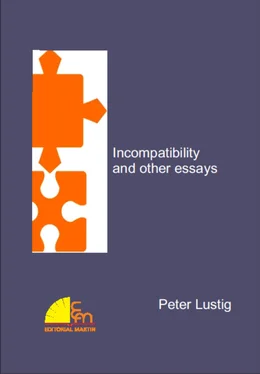By 1848, things had gone farther The barricades in Paris made a lot of people realize that it would be impossible to keep the underlings down much longer. The shortcomings of liberalism - with reference to the upholding of a thriving bourgeoisie at the cost of the “exploitation” of the workers, for whose convenience no provisions had been made, other than appealing to charity (of religious inspiration) and leaving open the possibility of state intervention - became apparent. However, no state possessed the financial capability to offer containment to the working class, in a predominantly urban industrial society, such as had evolved through large scale investment and entrepreneurship, precisely by that very bourgeoisie that had been able to accumulate savings.
The first signs of uneasiness appeared in response to rather far-flung prophesies announcing structural change, in which the state would replace private sources, after taking over all available assets. The way things were going was already clear around the middle of the XIX century, whether in France or the U.S (with its five year long Civil War, over land use and slave labour), or in Latin America, where political modernization was taking place (chiefly on paper, for the élite); so not much attention was actually being paid to see which sector of society was actually benefiting from a liberal democracy and who and how many were left tottering on the brink.
Already, a number of entrepreneurs running small family businesses were considering moving from Central and Eastern Europe to the U.S, around the time when the serfs were emancipated in Russia (roughly coinciding with the end of slavery in the defeated Confederacy). That Europe should have embarked upon the road to social upheaval some seventy odd years before the outbreak of World War I does not mean that people were unable to see what was coming. They simply did not know how to prevent it. In the same way, it can be said that, survival being the issue behind structural unemployment, it is hardly surprising that Keynes should have struck the nail on the head by seeking a way out of a social constraint that raised questions about the suitability of a political system based on universal suffrage. As long as government was prepared to step in and push start the economy, democracy might have a chance against the inevitability of economic cycles. If not, Statism (Communism or Fascism) would provide the answer. Why should events seem to have developed so shockingly and, in a sense, unpredictably, if all that was needed was to look the problem straight in the face, leaving aside blinkers and biases? What else did one have the right to expect, if decision-making had fallen into the hands of a disgruntled and irreverent majority, than that this majority should want to upset a system that considered it had fulfilled its duty by making available “opportunity”, when it was well known that opportunity always presents itself in a manner both piece-meal and haphazard.
VI.The Place for Nostalgia
That socialism should have come forward in two versions was not altogether surprising. Jacobinism had originally raised its protest against the gentry. Its offspring, social reform, raged against the bourgeoisie, which had concentrated, from the start, on reinforcing the principle of nationhood, as opposed to the narrow, class-centred alternative brought on by the Left. Consolidation of the nation state took place, in Italy, at the same time as the Vatican was deprived of its territories. The Church, as an ecumenical institution, was supra-national. The nation state became its ostensible rival and/or enemy; because it stood for the exact opposite: viz. the interests and the peculiarities of ethnic identities pitted against each other.
One immediate consequence of the insufficient power of such a nation state was the idea of Realpolitik (Bismarck’s name for pragmatism). That the mightiest military organizations should have felt obliged to make defensive alliances only proves that none was strong enough to hold its own against the others. Sooner or later the time would come when they would have to pit their strengths against each other. Does it make sense to claim that this could not have been anticipated, only because the exact date when it might happen was uncertain?
The Great War marked the end of an era. An era much lamented by the bourgeoisie. Why? Because politics were hereafter taken over by the masses. Those on the Left claimed to be peace-loving; those on the Right ranted war-like. Why was that unforeseeable, if Marxism was preaching the brotherhood of the workers, as a matter pertaining to class, independent of nationality, and their rivals were waving the banners of military acumen and cultural supremacy unflaggingly? As indicated above, while the Church was being sidelined, its place was taken, throughout the twenties and the thirties, by those two relentlessly hostile factions, despite a belated effort to introduce a “mixed” system, part state controlled and part “liberal”.
It should be understood that the position of the Church, with regard to Socialism and Fascism, is being considered exclusively in the light of politics. The trouble lies in that, once the political positions have been spelled out, there is no room left for anything else and it is too late for recanting, if only partly, on the ideological front (as could be seen all the way through the XX century); although this does not rule out a religious revival, such as was witnessed in places where religion had been outlawed for seventy years, under Soviet domination. That religion may be revived as a token to nostalgia is much like attributing sentimental value to reminiscing what the world used to be like before 1914, as the generation old enough to have cherished such memories as secure members of the bourgeois middle class used to do, in the course of reviewing their distress, because nothing would ever be the same again. The feeling of total loss, in addition to despair over starvation and hopelessness, in the aftermath of defeat, drove some to delude themselves into seeking shelter in the past; but if this past should have meant nothing to a majority of people, compelled to stake their lives to uphold a political order in which most of their kind were treated like outcasts, as a class, small wonder that loyalties should have been transferred away from Kaiser and Church, in order to bring about social reform along the lines of the complaisant “new man”, proclaimed by the Left, or the militant bully of the Right.
The one thing that these otherwise irreconcilable positions had in common was the need to dispose of entire sectors of society to make room for their own. It hardly mattered that, upon further analysis, it had been shown that the Right and the Left could be fitted into a single category: totalitarianism. Or that the bourgeoisie could be equated with the aspiring middle class that had many traits -such as a purposeful self-perception and a far-reaching overview- in common with the Jews. In some ways it was inevitable that what was left of both these cultural identities, after World War II, should have felt at loose ends about whatever they might have been able to contribute to post-war society; because the priority was to ensure survival and that could best be achieved through political empowerment, by granting statehood to the Jews and implementing the welfare state for all the others, including the freshly enfranchised masses (even where the single party vote prevailed pro forma).
It has been statistically proven that the cost in human lives, by the end of World War II, was almost ten times greater than that of the extermination of European Jewry. This cost was due to social engineering having taken a far greater toll than the actual fighting. Can there be any doubt that the issue of survival ought to focus on the individual, if so many human beings were summarily disposed of as ballast or surplus labour? During the XIX century, the industrial revolution had abused the urban poor with similar unconcern. In consequence, the conscience of the working class was aroused. Has anything of the sort been devised to vindicate the victims of the contemporary ideological hubris? Why should a return to the past, for sentimental reasons, provide less disastrous results today, if they are based on the same notions that produced those dreadful outcomes? What is the point of rationalizing about the inevitability of war, when civilization was meant to be the most effective construct to make recourse to force redundant?
Читать дальше












